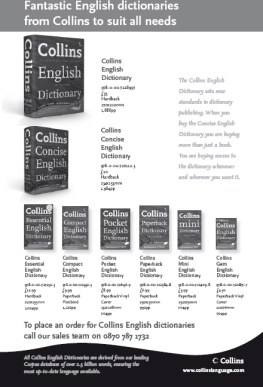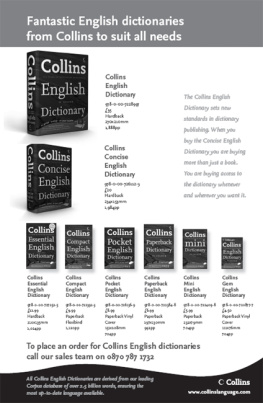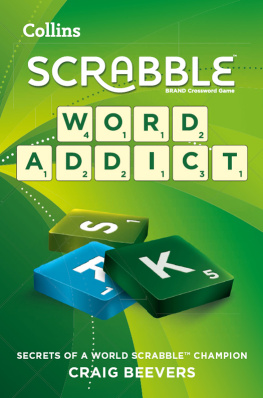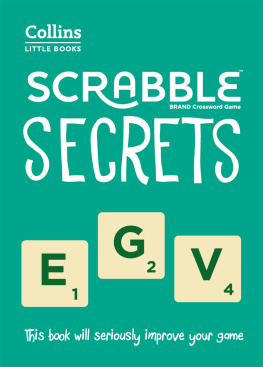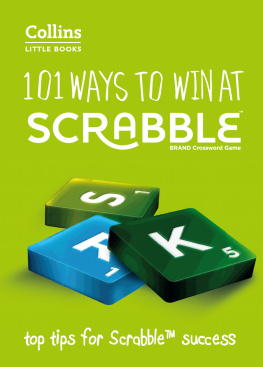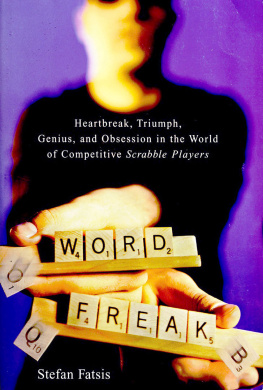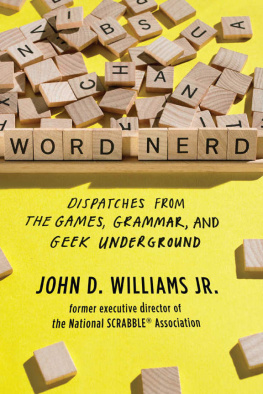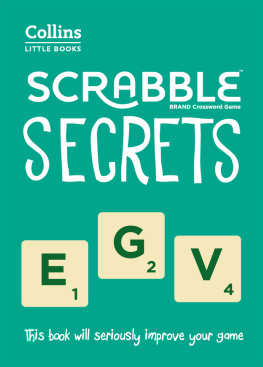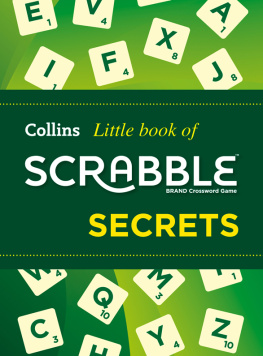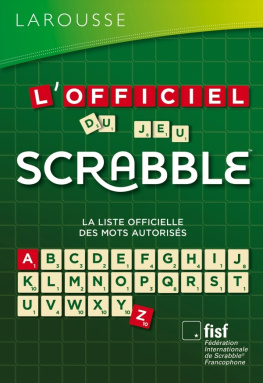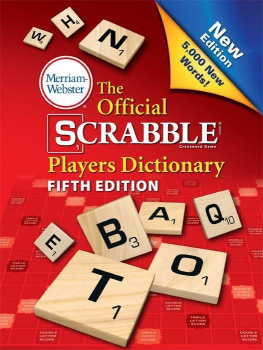
HarperCollins Publishers
Westerhill Road
Bishopbriggs
Glasgow
G64 2QT
First edition 2010
Reprint 10 9 8 7 6 5 4 3 2 1 0
Allan Simmons 2010
EPUB Edition June 2011 ISBN 978-0-00-744509-7
Scrabble Play Like A Champion 2010 Allan Simmons
SCRABBLE and associated trademarks and trade dress are owned by, and used under licence from, Mattel, Inc. SCRABBLE is a registered trademark of J.W. Spear & Sons Limited, a subsidiary of Mattel, Inc. 2010 Mattel, Inc. All Rights Reserved.
Collins is a registered trademark of HarperCollins Publishers Limited
www.collinslanguage.com
A catalogue record for this book is available from the British Library
Printed and bound in Italy
by LEGO SpA, Lavis (Trento), Italy
All rights reserved under International and Pan-American Copyright Conventions. By payment of the required fees, you have been granted the non-exclusive, non-transferable right to access and read the text of this e-book on screen. No part of this text may be reproduced, transmitted, downloaded, decompiled, reverse engineered, or stored in or introduced into any information storage and retrieval system, in any form or by any means, whether electronic or mechanical, now known or hereinafter invented, without the express written permission of HarperCollins.
Introduction
This book takes you through a journey of 15 top-level games of Scrabble as experienced by Allan Simmons when he played and won the 2007 UK Masters. The UK Masters is an event organized by the Association of British Scrabble Players (ABSP) for the top 16 players in the country; players are selected based on the tournament ratings achieved during the previous 12 months. Typically, this will always be players rated over 180. The very top of the ratings is around the 200 mark. At the event, players compete against each other once, in a round robin format, over a weekend, and the person who wins most games is declared the overall winner. Although Simmons has qualified for and played at numerous Masters events since the inaugural one in 1992, he has only won it once before, in 1994.
This book covers Simmons games in the order they were played at the event. Each game is treated as a separate chapter and begins with a short profile of Simmons opponent. There then follows the sequence of moves, one per page. For each move the reader is presented with Simmons rack and board position. Other information is also provided (the unseen letters and score differential) should you wish to make use of it in deciding what you might play yourself. You can then read Simmons thoughts and conclusion about what he played and why. The format readily enables the reader to cover up the bottom half of the page to hide the actual play until you are ready to reveal it, so you can pit your wits against a champion. At the end of each chapter there is a summary of all the racks, moves and scores complete with the final board diagram, followed by a chart showing the standing of each competitor at the end of that round. These charts also show a number alongside each players name which relates to their ranking at the start of the event.
There are some important points to note before reading the annotations as follows:
THE BLANKS
The blanks are depicted in different ways depending on whether they are being shown in text, on a rack, or on the board. When shown on the board, a letter represented by a blank will be shown as a faint letter. When shown on the rack, it appears as a blank square tile. When a blank is denoted as a letter in a word within the text, it is shown in lower-case. There is one exception to this: the letter L. When a blank is shown in text as an L, it will remain in uppercase so as not to confuse it with an uppercase I. For example, if the word TRAILED was spelt with the A as a blank it would be written as TRaILED. However if the L was a blank, it would be written as TRAIlED because TRAIlED would look odd.
PREMIUM SQUARES
When referring to the premium squares in the text abbreviations will often be used as follows:
dl = double-letter square (dls in plural form)
tl = triple-letter square (tls in plural form)
dw = double-word square (dws in plural form)
tw = triple-word square (tws in plural form)
POSITIONING WORDS
When referencing the start position of a word, the alpha and numeric grid references along the side and top of the board are used to define the starting square. This is then followed by and a(across) or a d(down) to indicate the direction of the play.
DEFINITIONS
Occasionally, where space permits, the definition of an unusual word may be included in the text. All unusual words that appear in the games are listed and defined separately in an appendix, with a reference to the game they first appear in.
SPREAD
Spread refers to the points margin in victory or defeat. If a player loses a game then the spread for that game is negative. If they win then it is positive. Over a series of games the spread shown alongside the number of wins is the accumulative spread for that player. For example, if players have lost games by more points than they have won games then their total spread will be a negative figure. Spread is used to determine the relative positions of players on an equal number of wins. The higher the spread the higher the position among players on the same number of wins. Thus, during a game that has a win safely in the bag prior to the endgame, it may be strategically wise to take managed risks to try and greedily increase the winning margin. Conversely, in a game that might be unwinnable its worth playing carefully to eke out the best moves that lose by the smallest margin.
TRACKING LETTERS PLAYED
It should be noted that at formal Scrabble tournaments it is allowable to make use of a tracking sheet; this allows players to cross off the letters as they are played. Simmons view of his tracking sheet is shown alongside each board position, and is sometimes referred to in the text if the unseen letters influence the decision about what to play.
PENALTY CHALLENGE
Most tournaments in the UK operate a free-challenge system whereby there is no penalty for an incorrect challenge. A few major events such as this tournament are played with a penalty challenge rule. If a player challenges a word or words, and the challenge fails (ie the play is acceptable), then the challenger is penalized 5 points for each word challenged. The penalty is added to the score for the move being challenged.
COMPUTER SUGGESTED BEST PLAY
At the end of each page the actual play, score and opponents reply is detailed in a box. Also included, for added interest, is the suggested best play by a computer program. There are several freely available programs that (as well playing the game) enable a position and rack to be input and then a simulation run to determine which of the many plays available are likely to give the most gain in points over the next few moves.
OFFICIAL WORD LIST
The 2007 UK Masters was the first event to use the then newly adopted Collins Scrabble (tournament and club) Wordlist. Thus, some of the words played in these games were getting their first ever airing at a Scrabble tournament.
RATINGS
The Association of British Scrabble Players (ABSP) runs the UK Scrabble rating system. Players get a rating whenever they play at a rated Scrabble tournament. A tournament rating will depend on how many games a player wins and the rating of the opponents played. A players rating for a game is the opponents rating plus 50 (if the game is won) or minus 50 (if the game is lost). The average rating for all games played is the tournament rating. A new player needs to have played 15 rated games to get a bona fide rating, after that, a regular players rating is based on the last 100 games they have played, modified by a weighting factor that puts more emphasis on recent games to reflect current form. The ABSP rating system is used to select players for major invitational events such as the World Championships and the annual UK Masters. For the UK Masters, the top 16 players are selected based on the ratings as at the end of March each year. The very top players tend to have ratings between 180 and 200.
Next page
